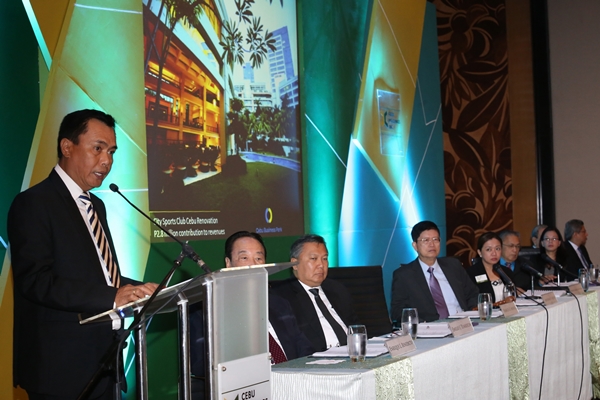
Cebu Holdings Inc. president Francis Monera addresses the annual stockholders meeting in Cebu City. Wiith him are the board of directors (from left) Enrique Benedicto, Emilio Tumbocon, chairman Antonio Aquino, June Vee Navarro, Fr. Roderick Salazar Jr., Ma. Theresa Javier, Hernando Streegan and Jaime Ysmael. (CDN PHOTO/JUNJIE MENDOZA)
With at least four new major projects in the pipeline, Cebu Holdings, Inc. (CHI) and Ayala Land Inc. (ALI) are raising their annual average investments in Cebu from P5 billion in the past to P6 billion in the next three years.
During a roundtable discussion after the CHI annual stockholders’ meeting yesterday, ALI president and chief executive officer Francis Monera and board chairman Antonio Aquino said they expect to increase ALI’s average annual investment for four projects that start this year.
“At P6 billion in the next three years, that’s about P18 billion on top of the P20 billion we have already committed for our projects here,” said Aquino.
One of the projects lined up this year is the redevelopment of the Cebu IT Park, which is managed by subsidiary company Cebu Property Ventures and Development Corp. (CPVDC).
“We aim to replicate the success of the Cebu Business Park with Cebu IT Park. We are finalizing the masterplan for a mixed-used “superblock” which will include a regional mall, office buildings and a hotel at the heart of the bustling IT Park,” said Monera.
The “superblock” covers two hectares.
CHI also recently entered into two joint ventures with two Cebu-based developers – Taft Property Venture Development Corp. (TPVDC) and AboitizLand Inc.
“The 12-hectare project that we will be doing in Mactan with the Gaisano group of Taft Property will be more of a leisure type community with sea breeze verandas, more of a resort-residential development,” said Aquino.
A 15-hectare project with AboitizLand in Subangdaku, Mandaue City, is envisioned to be another business center in Mandaue City.
A fourth project under construction, Amaia Steps, is the first project under Amaia Land Corp., which is the fourth brand of ALI.
Amaia Steps offers 576 units within two low-rise buildings in 8,000 square meters along Plaridel Street in Mandaue City.
CHI registered a 13 percent growth in net income last year with P501.1 million.
Consolidated revenues was P2.2 billion, a 33 percent growth from that of 2012.
According to Monera, half of the revenues came from their leasing business as part of their strategy to increase their leasing portfolio. This was followed by real estate sales with 28 percent share.